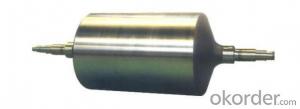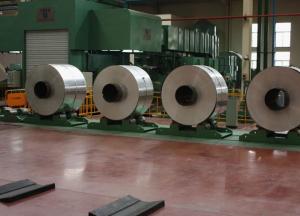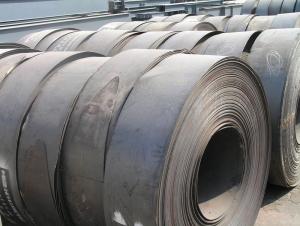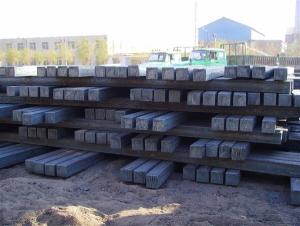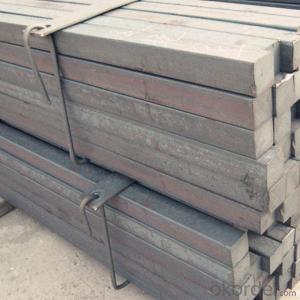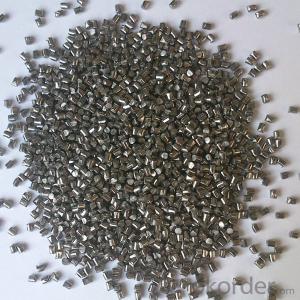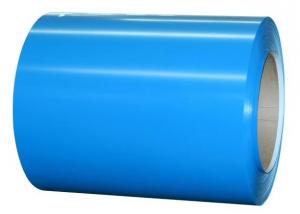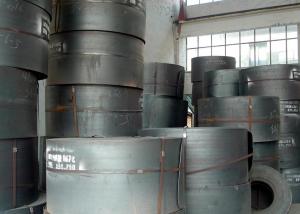In-furnace Support Roll
- Loading Port:
- Tianjin
- Payment Terms:
- TT OR LC
- Min Order Qty:
- 1000 PCS
- Supply Capability:
- 10000 PCS/month
OKorder Service Pledge
OKorder Financial Service
You Might Also Like
Quick Details
| Place of Origin: | Brand Name: | Model Number: | In-furnace support roll | ||
| Application: | machinery | Material: | Steel,9Cr2Mo, 86CrMoV7,60CrMo,VC9 | Dimensions: | 420*9870 |
| Type: | Forging Parts | Certification: | ISO9001 | Diameter: | 30-800mm |
Packaging & Delivery
| Packaging Detail: | wooden case |
| Delivery Detail: | 30-50 working days |
Specifications
1. High coefficient of friction
2. Non-marking roll surface
3. Long life
4.Cut resistance
In-furnace support roll
Rolls series:
--Backup rolls and work rolls for sheet and strip mills
--Breakdown rolls
--Section mill rolls and sleeves for long product mills
--Backup rolls and work rolls for plate mills.
Quality Standard:
Wear resistance, Damage tolerance, and Fatigue endurance.
Specification of Roll | Scope |
Diameter of Barrel | 400~3500mm |
Length of machining | ≤20,000mm |
Process | Forging, Casting |
Material | Alloy steel, Carbon steel, Iron, etc. (86CrMoV7, 9Cr2Mo,9Cr3Mo, 70Cr3Mo,MC3,MC5,SHSS...) |
Barrel hardness | Work roll: ≥ 95HSD, 90~96HSD, 70-90HSD |
Neck hardness | 30~50HSD, 50~65HSD, 75-90HSD |
Barrel hardness evenness | ≤3HSD |
Hardness depth of barrel(one side) | 12~18mm(2%Cr series), 18~35mm(3%Cr series), 20~40mm(5%Cr series) |
Chenmical Analysis
Clssification | Hardness | C | Si | Mn | Ni | Cr | Mo |
Chilled I | 60-70 | 3.0~3.5 | 0.25~0.5 | 0.3~0.8 | 0.5~1.0 | 0.4~1.0 | 0.2~0.6 |
Chilled II | 62-75 | 3.0~3.5 | 0.25~0.5 | 0.3~0.8 | 1.0~2.0 | 0.5~1.2 | 0.2~0.6 |
Chilled III | 65-80 | 3.0~3.5 | 0.25~0.5 | 0.3~0.8 | 2.0~3.0 | 0.6~1.5 | 0.2~0.6 |
Chilled IV | 70-85 | 3.0~3.5 | 0.25~0.5 | 0.3~0.8 | 3.0~4.5 | 0.6~1.5 | 0.2~0.6 |
Applications
--TMT Rolling Mills
--U-Section Mills
--Thin Flat Rolling
--Mills ICCI Intermediate Stand Rolls
--ICCI Finishing
--Stand Rolls Deep Section Mills
--Round Rolling Mills
--Wire Rod Rolling Mills
--T-Section Mills
--Narrow Strip Mills
- Q:How is steel rebar threaded for connecting reinforcement bars in construction?
- Steel rebar is threaded for connecting reinforcement bars in construction using a process called threading. Threading involves creating threads on the end of the rebar using a specialized machine called a threader. The threader cuts grooves into the rebar, which allows it to be easily connected to other reinforcement bars using nuts and bolts or couplers. This threaded connection helps to reinforce the structure and ensure stability in construction projects.
- Q:What are the main properties of steel?
- The main properties of steel include high strength, durability, versatility, and excellent thermal and electrical conductivity. Additionally, steel is known for its corrosion resistance, ease of fabrication, and recyclability.
- Q:How do steel products contribute to sustainability and environmental protection?
- Steel products contribute to sustainability and environmental protection in several ways. Firstly, steel is a highly durable material, allowing products made from it to have a longer lifespan and reducing the need for frequent replacements. This helps conserve resources and reduce waste. Additionally, steel is 100% recyclable, meaning it can be reused indefinitely without losing its properties. Recycling steel reduces the demand for raw materials and lowers energy consumption and greenhouse gas emissions associated with its production. Furthermore, steel is used extensively in renewable energy infrastructure, such as wind turbines and solar panels, contributing to a cleaner and more sustainable energy mix. Overall, steel products play a crucial role in promoting a circular economy and minimizing the environmental impact of various industries.
- Q:How are steel products used in the construction of public transportation systems?
- Steel products are used extensively in the construction of public transportation systems due to their strength, durability, and versatility. Steel is commonly utilized for the structural framework of bridges, tunnels, railway tracks, and elevated platforms, ensuring the infrastructure can withstand heavy loads and constant use. Additionally, steel is used in the manufacturing of train and subway cars, providing a safe and reliable means of transportation for the public.
- Q:What are the common types of steel products used in the chemical industry?
- Some common types of steel products used in the chemical industry include stainless steel, carbon steel, and alloy steel. These materials are chosen for their corrosion resistance, durability, and ability to withstand high temperatures and pressures. Stainless steel is particularly popular due to its superior resistance to chemical corrosion, while carbon steel is often used for less corrosive applications. Alloy steel, on the other hand, offers enhanced strength and performance characteristics through the addition of various alloying elements.
- Q:What are the different grades of steel and their applications?
- There are several grades of steel, each with its own unique properties and applications. Some common grades include mild steel, which is a versatile and widely used grade for general construction and fabrication purposes; stainless steel, known for its corrosion resistance and used in kitchen appliances, medical equipment, and chemical processing; high carbon steel, used for making cutting tools and machinery parts that require high strength; and alloy steel, which contains various elements to enhance its strength, durability, and heat resistance, commonly used in automotive and aerospace industries. These are just a few examples, and there are many more grades of steel available, each tailored for specific applications based on their composition and properties.
- Q:How are steel pipes used in the transportation of chemicals?
- Steel pipes are commonly used in the transportation of chemicals due to their high strength and durability. They are designed to withstand the corrosive nature of many chemicals and can safely transport them over long distances. The smooth interior surface of steel pipes also helps to minimize friction and maintain the purity of the chemicals being transported. Additionally, steel pipes can be easily connected and installed, making them a reliable choice for the transportation of chemicals in various industries.
- Q:How is steel forgings inspected for quality assurance?
- Steel forgings are inspected for quality assurance through various methods such as visual inspection, dimensional measurements, non-destructive testing techniques like ultrasonic testing or magnetic particle inspection, and mechanical testing. These inspections ensure that the forgings meet the required specifications, including dimensions, surface finish, and internal soundness. Additionally, third-party certifications and audits may be conducted to ensure compliance with industry standards and customer requirements.
- Q:What are the different types of steel products used in the manufacturing of outdoor furniture?
- The different types of steel products commonly used in the manufacturing of outdoor furniture include steel tubes, steel rods, steel sheets, and steel wire. These steel products are used to create the structural components of the furniture, such as frames, legs, and support structures. They provide durability, strength, and resistance to outdoor elements, making them ideal for outdoor furniture applications.
- Q:What is the importance of steel reinforcement in concrete structures?
- The steel reinforcement in concrete structures is crucial because it enhances the strength and durability of the concrete. It helps to resist tensile forces that concrete alone cannot withstand, such as bending, cracking, and stretching. Steel reinforcement also improves the overall structural integrity of the concrete, ensuring that it can withstand heavy loads and external pressures. Additionally, it helps to prevent potential structural failures and increases the lifespan of the concrete structure.
1. Manufacturer Overview |
|
|---|---|
| Location | |
| Year Established | |
| Annual Output Value | |
| Main Markets | |
| Company Certifications | |
2. Manufacturer Certificates |
|
|---|---|
| a) Certification Name | |
| Range | |
| Reference | |
| Validity Period | |
3. Manufacturer Capability |
|
|---|---|
| a)Trade Capacity | |
| Nearest Port | |
| Export Percentage | |
| No.of Employees in Trade Department | |
| Language Spoken: | |
| b)Factory Information | |
| Factory Size: | |
| No. of Production Lines | |
| Contract Manufacturing | |
| Product Price Range | |
Send your message to us
In-furnace Support Roll
- Loading Port:
- Tianjin
- Payment Terms:
- TT OR LC
- Min Order Qty:
- 1000 PCS
- Supply Capability:
- 10000 PCS/month
OKorder Service Pledge
OKorder Financial Service
Similar products
New products
Hot products
Related keywords
